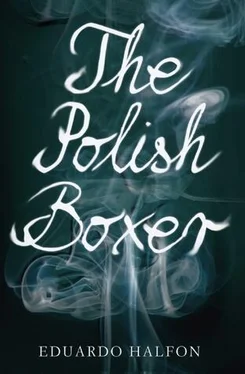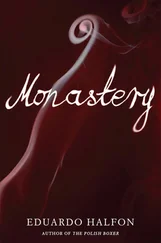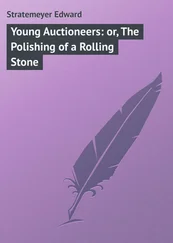Eduardo Halfon - The Polish Boxer
Здесь есть возможность читать онлайн «Eduardo Halfon - The Polish Boxer» весь текст электронной книги совершенно бесплатно (целиком полную версию без сокращений). В некоторых случаях можно слушать аудио, скачать через торрент в формате fb2 и присутствует краткое содержание. Год выпуска: 2012, Издательство: Bellevue Literary Press, Жанр: Современная проза, на английском языке. Описание произведения, (предисловие) а так же отзывы посетителей доступны на портале библиотеки ЛибКат.
- Название:The Polish Boxer
- Автор:
- Издательство:Bellevue Literary Press
- Жанр:
- Год:2012
- ISBN:нет данных
- Рейтинг книги:4 / 5. Голосов: 1
-
Избранное:Добавить в избранное
- Отзывы:
-
Ваша оценка:
- 80
- 1
- 2
- 3
- 4
- 5
The Polish Boxer: краткое содержание, описание и аннотация
Предлагаем к чтению аннотацию, описание, краткое содержание или предисловие (зависит от того, что написал сам автор книги «The Polish Boxer»). Если вы не нашли необходимую информацию о книге — напишите в комментариях, мы постараемся отыскать её.
marks the debut of a major new Latin American voice in English.
The Polish Boxer — читать онлайн бесплатно полную книгу (весь текст) целиком
Ниже представлен текст книги, разбитый по страницам. Система сохранения места последней прочитанной страницы, позволяет с удобством читать онлайн бесплатно книгу «The Polish Boxer», без необходимости каждый раз заново искать на чём Вы остановились. Поставьте закладку, и сможете в любой момент перейти на страницу, на которой закончили чтение.
Интервал:
Закладка:
For dinner we had a salad with tomato and cucumber and spicy paprika, then something called gibanica, which was like filo pastry with spinach and cheese. While we ate, Slavko carried on pouring me shots of the light coffee-colored liqueur and Marko talked to me about his grandfather or maybe his great-grandfather who was one of the most famous painters in the country. I wanted to ask him what country, as the geographical situation still had me pretty confused, but I decided it was inopportune, and besides, I wasn’t in the mood for more conversations about politics. Yugoslavia, I whispered, half-drunk now, but I don’t think anyone heard or maybe they did. Marko said that afterward he’d show me a book with some of the famous painter’s works. Hvala, thanks, I said, and everyone laughed. Slavko got out another bottle and, pouring me out some transparent liqueur, said try it, try it, it’s called viljamovka. It tasted of pear. And without asking, he poured me another. Zdena had prepared a pot of coffee, four cups exactly, and we all started to smoke and drink coffee in silence. A delicious silence. Marko suddenly belched, loudly and without the slightest bit of embarrassment, and as though that were some sort of signal, I told them that I loved Gypsy music, that I loved the music of Serbian Gypsies, and wondered where I could hear some live. Well, on the streets, said Marko, that lot are always going round begging and playing trumpets and violins. And no one said anything else.
I hugged Slavko goodbye and then Zdena and her dad took me to the little apartment on Nedeljka Čabrinovića. Marko waited in the car. Even though I was a bit drunk, I managed to make it up the four flights of stairs and listen to Zdena as she explained how to open the door and how to turn on the water heater. It’s Slavko’s apartment, she said, but we’ve fixed it up a bit for you. I thanked her. Seriously, Zdena, I’m really interested in Gypsy music, I said with a mixture of pathos and pleading that took me right back to being seven years old, standing at the gates of the zoo, and what a tantrum I threw with my mother because I was so bent on her buying me a wrestling mask, the one that El Santo wore. Zdena just smiled. Then she wrote the addresses and phone numbers on a slip of paper and told me that I should take only taxis marked Beo or Yellow or Pink or Lux or Maxis or Bell and no others. Do viđenja, she said, which means goodbye. Do viđenja, I repeated.
I went to bed without getting undressed and without unpacking anything, and I remember that the last thing I thought of before falling into a deep sleep was the word Yugoslavia.
I woke up with a headache, but two aspirins and a long, hot shower made me feel much better. I was about to go out, when the phone rang. It was Zdena. In a sleepy voice, she told me she’d been thinking about what I’d asked her about Gypsy music and that I could walk down Knez Mihajlova Street, or through a bohemian neighborhood called Skadarlija. Write it down. Skadarlija. There are some really nice cafés there where Gypsies play sometimes. I thanked her, and in the background I could hear Slavko whispering something. Listen, Slavko says that he’s going to be here all day, working, so you can come over whenever you like. Working on what? I thought a bit apprehensively, but I just thanked her again. Before I hung up, Zdena listed the names of the genuine taxi companies again, one by one.
It was snowing softly. I was hungry and wanted a coffee, but I didn’t have any local currency with me. Dinars, they’re called. After walking down Pozeska Street for a while, I went into a bank, and a woman who I thought looked like a chubby, Balkan version of Penelope Cruz, although I’m not sure why — her mouth, perhaps — asked me to show her my passport and fill out some forms. I had to wait almost half an hour before she gave me a wad of old bills that, oddly, still said Banka Jugoslavije. What a mess of a country, I thought as I walked out. Next to the bank there was a little café. It was empty. On one wall they’d hung two photos: one of Tito and one, a little bigger, of the CHiPs cops, the dark one and the blond one, holding their helmets. Coffee, I said to the waiter, miming a huge cup of coffee. Kafa, he said, and then he said something else. I just shrugged. I pointed to some ham rolls that he had on the counter and that looked a bit stale. I finished everything quickly, gave him a few dinars, almost nothing really, and walked out. It wasn’t snowing anymore but it wasn’t sunny either. At a kiosk I bought a pack of Lucky Strikes (Slavko’s influence, of course), a lighter, and two bars of chocolate, and then, already on my way to the bohemian quarter that Zdena had made me write the name of, I felt slightly nervous as I realized I hadn’t checked the name of the taxi company. I opened the window, lit a cigarette, and put on my best murderer’s face.
People wrapped up in gray and black. More bombed-out buildings. New smells and sounds that were also somehow the same ones as always. There’s nothing like the fear of getting lost in an unknown city, I thought as I saw the guy’s shrewd eyes in the rearview mirror. We went past the pink police station, and for some reason I felt safer. We stopped at a light. Some way off, sitting alone on what seemed to be a Persian rug, was a kid dressed in rags, playing the accordion. Ciganin? I asked the taxi driver — I don’t know how I remembered the word — and he nodded. He said something that sounded like an insult. I gave him a bit of money and got out.
The kid was dressed up, even though everything clashed with everything else: olive green jacket, corduroy pants, green-and-blue-striped shirt, gray felt hat. I threw a coin into the little bronze pot he had by his shoes, and without stopping, he smiled with his half-rotten teeth. It was the same Gypsy music I already knew, but it was also completely different. More visceral, or maybe more rural. The tune sounded sweet and bitter at the same time. Like his face, I thought. Beneath the music, beyond the music, I could hear his little fingernails tip-tapping on the keys and buttons. I knelt down. He stopped without looking up. I threw another coin into the bronze pot and he started playing again. And we went back and forth like that for a while, like cat and mouse. Every time the music stopped, I’d throw another coin and he’d play for a bit before stopping again. At one of these moments, when the kid stopped playing, he told me something in Serbian or maybe in Romany. I just shrugged and shook my head, but the kid kept talking and laughing as if I understood him or as if it didn’t matter if I understood him. Then, still talking to me, he started to play chords that somehow accompanied what he was telling me. Sometimes it sounded like a story, sometimes like a song, and sometimes it sounded like a joke. Impossible to know. He stopped playing. He asked me something and this time waited in silence for a reply. He stood up and asked me again, impatiently, almost annoyed. I got up too.
Then, out of nowhere, a Gypsy girl appeared, a bit older and a lot darker than he was, carrying a handful of withered roses. She wore a long, flowery dress, a flowery handkerchief on her head, and a thick, moth-eaten green wool sweater. She smelled like passion fruit. She handed me a rose and I gave her a ten-dinar bill. She took the bill and then picked up the coins from the bronze pot and put it all down her blouse, although she looked too young to be wearing a bra. I took out my cigarettes, and the boy, making a sign with his fingers, asked me for one. I held out the open pack. He took five. She also took five. They both stashed their cigarettes away, took one more each, and put them in their mouths. I gave them a light. The girl grabbed my right hand and started tracing the lines of my palm with her index finger: she was reading it for me or acting as if she was reading it for me without my understanding anything. She looked delighted. Then she looked worried. She gave me back my hand and held out her own. I gave her another ten dinars. Then the boy, without taking his accordion off, rolled up the little rug, threw it over his shoulder, and the three of us started walking as we smoked.
Читать дальшеИнтервал:
Закладка:
Похожие книги на «The Polish Boxer»
Представляем Вашему вниманию похожие книги на «The Polish Boxer» списком для выбора. Мы отобрали схожую по названию и смыслу литературу в надежде предоставить читателям больше вариантов отыскать новые, интересные, ещё непрочитанные произведения.
Обсуждение, отзывы о книге «The Polish Boxer» и просто собственные мнения читателей. Оставьте ваши комментарии, напишите, что Вы думаете о произведении, его смысле или главных героях. Укажите что конкретно понравилось, а что нет, и почему Вы так считаете.












